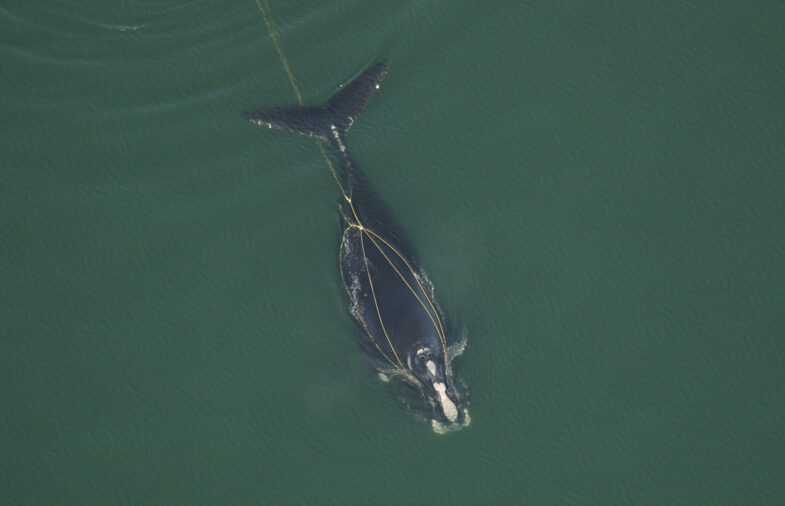US budget riders compromise conservation
Originally published in Science Magazine, February 23, 2023.

Photo | Florida Fish and Wildlife Conservation Commission, NOAA Research Permit # 594-1759
In the story “Research gets a boost in final 2023 spending agreement” (23 December 2022, p. 1263), the Science News Staff describe the US omnibus budget bill’s science investments, but they do not include the details of a last-minute rider that affects the Critically Endangered North Atlantic right whale (NARW) (Eubalaena glacialis).1, 2 Budget riders are additions to US federal budget bills. Because the bills are required to fund the US government, their eventual passage is guaranteed. If special interests can convince representatives to include a rider, they can bypass a full debate on policies that conflict with scientific evidence and established law. The use of appropriations riders as shortcuts to pass policies that circumvent existing environmental laws should not be tolerated.
With fewer than 350 individuals remaining, and their numbers in decline, NARWs are at risk of extinction. 3Entanglement in fishing gear is one of the primary drivers of their morbidity and mortality.4 In addition, because entanglement stunts the growth of individual NARWs and smaller females have fewer calves, entanglements reduce the species’ calving rate for decades.5 Despite the threats posed by entanglements, the recent rider allows the government more time to finalize regulations that require fisheries to mitigate them.
The rider was introduced after a series of court cases established that according to US law, fisheries must consider the health of the NARW population. In July 2022, after the US National Marine Fisheries Service (NMFS) declared that fisheries affect but present “no jeopardy” to NARW’s continued existence, a federal judge ruled that the agency had violated both the Endangered Species Act of 1973 (ESA) and Marine Mammal Protection Act of 1972.6 The judge also ruled that NMFS’s proposed management measures to mitigate fisheries’ impacts on NARWs were insufficient, also in violation of the Marine Mammal Protection Act. In September 2022, groups associated with the fishing industry attempted to overturn the NMFS opinion of “no jeopardy,” on the grounds that the decision’s acknowledgment that fisheries affect NARWs overstated the risk. A judge rejected the proposed change given the evidence that the report understated rather than overstated the danger to NARWs.7 In November 2022, the court decided that new rules to reduce fisheries’ impacts on NARWs should be in place by December 2024.8 Yet the following month, the budget rider negated the court’s ruling by extending the deadline to 2028.
Budget riders have been used to sidestep the ESA in the past. Previous riders, affecting gray wolves (Canis lupus)9 and greater sage-grouse (Centrocercus urophasianus)10, did not create the near-term risk of a species’ extinction. However, they established a precedent in Congress for using riders to circumvent the ESA. Appropriations riders should not overrule established environmental legislation and decision-making that is based on science-based, peer-reviewed, wildlife conservation strategies.
 Kyla Bennett is PEER’s Director of Science Policy and the Director of PEER’s New England/Mid-Atlantic field office. She is a scientist and attorney formerly with U.S. EPA.
Kyla Bennett is PEER’s Director of Science Policy and the Director of PEER’s New England/Mid-Atlantic field office. She is a scientist and attorney formerly with U.S. EPA.

Peter Corkeron is a former National Oceanic and Atmospheric Administration (NOAA) scientist and former Senior Scientist at the New England Aquarium.
Michael J. Moore is a whale specialist at the Biology Department of the Woods Hole Oceanographic Institution
- J. G. Cooke, “Eubalaena glacialis (errata version published in 2020)” (The IUCN Red List of Threatened Species, 2020); https://www.iucnredlist.org/species/41712/178589687
- Consolidated Appropriations Act, 2023 (2022); https://www.congress.gov/bill/117th-congress/house-bill/2617/
- North Atlantic Right Whale Consortium, “North Atlantic right whales’ downward trend continues as updated population numbers released,” New England Aquarium (2022)
- M. J. Moore et al., Dis. Aquat. Org. 143, 205 (2021)
- M. J. Moore, ICES J. Mar. Sci.(2023)
- J. Boasberg, “Memorandum Opinion on Civil Action No. 18-112” (2022); https://www.biologicaldiversity.org/species/mammals/North_Atlantic_right_whale/pdfs/218-2022-07-08-Decision-on-Summ-Judg-NARW-2-0.pdf
- J. Boasberg, “Memorandum Opinion on Civil Action No. 21-2509” (2022); https://www.biologicaldiversity.org/species/mammals/North_Atlantic_right_whale/pdfs/76-2022-09-08-MLA-SJ-Decision-North-Atlantic-Right-Whale.pdf
- C. Chase, “Judge grants US lobster fishery two-year reprieve from right whale-related restrictions,” Seafood Source (2022); https://www.seafoodsource.com/news/supply-trade/us-lobster-fishery-gets-reprieve-from-court-in-ongoing-right-whale-lawsuit
- E. Byron, “Budget bill rider will delist wolves,” Helena Independent Record (2011)
- Consolidated Appropriations Act, 2018 (2018); https://www.congress.gov/bill/115th-congress/house-bill/1625/